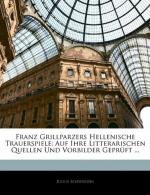|
This section contains 1,584 words (approx. 6 pages at 300 words per page) |

|
SOURCE: “Grillparzer's Relation to Classical Idealism,” in MLN, Vol. 51, June, 1936, pp. 359-63.
In the following essay, Kaufmann examines the major influences on Grillparzer's work, in particular the effect of classical idealism.
Literary criticism rather early recognized the fact that Grillparzer followed Schiller's model in his earliest dramatic attempts and plans, as in Lucretia Creinwell, Seelengrösze, Robert von der Normandie, and that from about 1809 on, besides that of Shakespeare and the Romanticists, he yielded more to the influence of Goethe, as e. g., in his Faustplan, Irenens Wiederkehr and the dramatic sketch Spartakus. As to Grillparzer's mature works, Goethe's influence is especially seen in the characters of Sappho and Hero and in the Greek setting of Sappho, Das goldene Vlies, and Des Meeres und der Liebe Wellen; a Goethean desire for classical simplicity and harmony is attributed to the recurring inspiration from Iphigenie.
This more or less exterior...
|
This section contains 1,584 words (approx. 6 pages at 300 words per page) |

|


